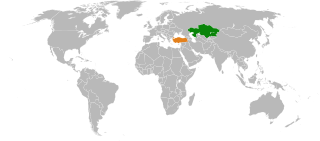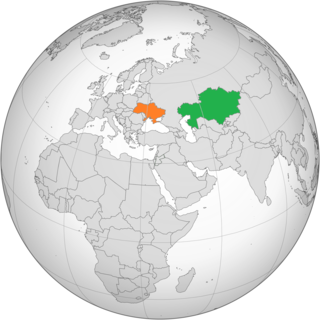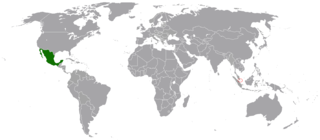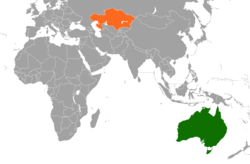
Foreign relations of Kazakhstan are primarily based on economic and political security. The Nazarbayev administration has tried to balance relations with Russia and the United States by sending petroleum and natural gas to its northern neighbor at artificially low prices while assisting the U.S. in the War on Terror. Kazakhstan is a member of the United Nations, Organization for Security and Co-operation in Europe, North Atlantic Cooperation Council, Commonwealth of Independent States, the Shanghai Cooperation Organisation, and NATO's Partnership for Peace program. Kazakhstan established a customs union with Russia and Belarus, transformed into the Eurasian Economical Community then in 2015 into the Eurasian Economic Union. President Nazarbayev has prioritized economic diplomacy into Kazakhstan's foreign policy.

Foreign relations of Australia are influenced by its position as a leading trading nation and as a significant donor of humanitarian aid. Australia's foreign policy is guided by a commitment to multilateralism and regionalism, as well as to build strong bilateral relations with its allies. Key concerns include free trade, terrorism, refugees, economic co-operation with Asia and stability in the Indo-Pacific. Australia is active in the United Nations and the Commonwealth of Nations. Given its history of starting and supporting important regional and global initiatives, it has been described as a regional middle power par excellence.

A consulate is the office of a consul. A type of diplomatic mission, it is usually subordinate to the state's main representation in the capital of that foreign country, usually an embassy or – between Commonwealth countries – high commission. Like the terms embassy or high commission, consulate may refer not only to the office of consul, but also to the building occupied by the consul and the consul's staff. The consulate may share premises with the embassy itself.

Foreign relations exist between Australia and Greece. Relations between the two states are close: the countries were allies during both World Wars and the Korean War. During World War II, Australian forces took part in the Battle of Greece and the Battle of Crete. There is a large Greek community in Australia. Each country has an embassy in the other's capital. Greece also has consulates general in Sydney, Melbourne and Adelaide, as well as a consulate in Perth, honorary consulates general in Brisbane and Darwin, and honorary consulates in Newcastle and Hobart. Both countries are full members of the Organisation for Economic Co-operation and Development.

Diplomatic relations between Australia and Ukraine were established in 1992. Ukraine has had an embassy in Canberra since March 2003 and the Australian Embassy in Kyiv was established in December 2014.

Foreign relations exist between Australia and Malta. Both countries have full embassy level diplomatic relations since 1967. As both countries are members of the Commonwealth, both are represented by High Commissions, with Australia maintaining a High Commission in Valletta, and Malta a High Commission in Canberra. In addition, Malta has two Consulates-General, and four honorary consulates.

The Embassy of Australia in Moscow is the diplomatic mission of Australia to the Russian Federation. The current head of post and Ambassador of Australia to the Russian Federation is Graeme Meehan. The embassy serves as the diplomatic mission for Australia to the Russian Federation, Armenia, Belarus, Kazakhstan, Kyrgyzstan, Tajikistan, Turkmenistan and Uzbekistan. The chancery is located at 10A/2 Podkolokolny Lane in the Tagansky District of Moscow.

Foreign relations exist between Australia and Estonia. Australia first recognised Estonia on 22 September 1921. Australia was among the first countries to re-recognise Estonia's independence on 27 August 1991. Both countries re-established diplomatic relations on 21 November 1991.

Kazakh–Turkish relations are foreign relations between Kazakhstan and Turkey. Turkey recognized Kazakhstan on 16 December 1991, being the first state to recognize the independence of Kazakhstan, when Kazakhstan declared its independence. Diplomatic relations between the two countries were established on 2 March 1992. These relations have developed positively on the international stage as well as in commerce and strategic affairs. Kazakhstan has an embassy in Ankara and a consulate general in Istanbul. Turkey has an embassy in Almaty and a branch office in Nur-Sultan.

Kazakhstan–Ukraine relations are foreign relations between Kazakhstan and Ukraine. Before 1918, both countries were part of the Russian Empire and until 1991 they were part of the USSR. Both countries established diplomatic relations in 1991. Kazakhstan has an embassy in Kyiv and an honorary consulate in Odessa. Ukraine has an embassy in Nur-Sultan and a consulate-general in Almaty.

Current and historical relations exist between the Commonwealth of Australia and the Federative Republic of Brazil. Both nations are members of the Cairns Group, G20 and the United Nations. Australia and Brazil are the largest countries in the Southern Hemisphere.

The United Mexican States and the Republic of Singapore have had diplomatic and other bilateral relations since 1975. Both nations are members of the Asia-Pacific Economic Cooperation and the United Nations.

Kazakhstan–Mexico relations refers to the bilateral relations between Kazakhstan and Mexico. Both nations are members of the United Nations and the World Trade Organization.

Kazakhstan–Serbia relations refer to bilateral relations between Kazakhstan and Serbia. Serbia opened an embassy in Nur-Sultan in June 2011, and Kazakhstan opened a consulate in Belgrade in June 2015.

France–Kazakhstan relations refers to the diplomatic relations between France and Kazakhstan. Both nations are members of the Organization for Security and Co-operation in Europe.

Belarus–Mexico relations refers to the foreign relations between Belarus and Mexico. Both nations are members of the United Nations.


















